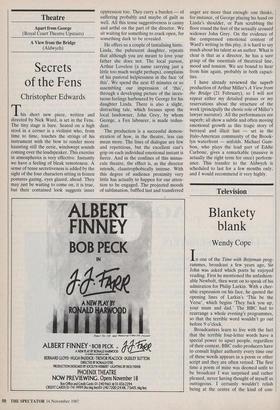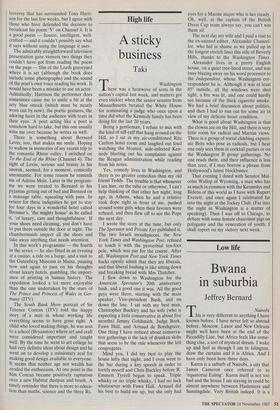Television
Blankety blank
Wendy Cope
In one of the Time with Betjeman prog- rammes, broadcast a few years ago, Sir John was asked which poets he enjoyed reading. First he mentioned the unfashion- able Newbolt, then went on to speak of his admiration for Philip Larkin. With a cher- ubic expression on his face, he quoted the opening lines of Larkin's 'This be the Verse', which begins 'They fuck you up, your mum and dad.' The BBC had to rearrange a whole evening's programmes, so that the terrible word wouldn't go out before 9 o'clock.
Broadcasters learn to live with the fact that the terrible four-letter words have a special power to upset people, regardless of their context. BBC radio producers have to consult higher authority every time one of these words appears in a poem or other script and they are often vetoed. The first time a poem of mine was deemed unfit to be broadcast I was surprised and rather pleased, never having thought of myself as outrageous. I certainly wouldn't relish being at the centre of the kind of con- troversy that has surrounded Tony Harri- son for the last few weeks, but I agree with those who have defended the decision to broadcast his poem 'V' on Channel 4. It is a good poem — honest, intelligent, well- crafted — and it couldn't possibly say what it says without using the language it uses.
The admirably straightforward television presentation gave viewers two things they couldn't have got from reading the poem on the page — film of the Leeds graveyard where it is set (although the book does include some photographs) and the sound of the poet's own voice reading his work. It would have been a mistake to use an actor. Admittedly, Harrison the performer does sometimes cause me to smile a bit at the arty blue smock (which must be nearly worn out by..now), the poetic gestures, the adoring faces in the audience with tears in their eyes. A poet acting like a poet is somehow hard to take, but this one usually wins me over because he writes so well.
There is something about Bernard Levin, too, that makes me smile. Hoping to wallow in memories of my recent trip to the romantic Rhine valley, I switched on To the End of the Rhine (Channel 4). The sight of Levin, serious and brainy in his anorak, seemed, for a moment, comically unromantic. For some reason he reminds me of Adrian Mole. Later in the program- me we were treated to Bernard in his pyjamas getting out of bed and Bernard on a massage table, squealing with pain. In return for these indignities he got to stay for four days in a wonderful hotel called Brenner's, 'the mighty house' as he called it, 'of luxury, care and thoughtfulness'. If your shoes need cleaning, you don't have to put them outside the door at night. The chambermaids inspect all the shoes and take away anything that needs attention.
In this week's programme — the fourth in the series — he also fitted in an evening at a casino, a ride on a barge, and a visit to the Gutenberg Museum in Mainz, pausing now and again to pass on his thoughts about luxury hotels, gambling, the import- ance of printing in human history. The expedition looked a lot more enjoyable than the one undertaken by the stars of The Prince and Princess of Wales in Ger- many (ITV).
The South Bank Show portrait of Sir Terence Conran (ITV) told the happy story of a man in whose working life everything seems to have gone right. A child who loved making things, he was sent to a school (Bryanston) where art and craft were considered important and taught well. By the time he went to art college he had very definite ideas about design and he went on to develop a missionary zeal for making good design available to everyone. It seems that neither age nor wealth has eroded the enthusiasm. At one point in the film Conran became positively rapturous over a new Habitat dustpan and brush. A timely reminder that there is more to educa- tion than maths, science and the three Rs.











































































 Previous page
Previous page